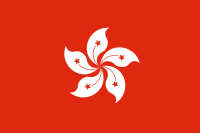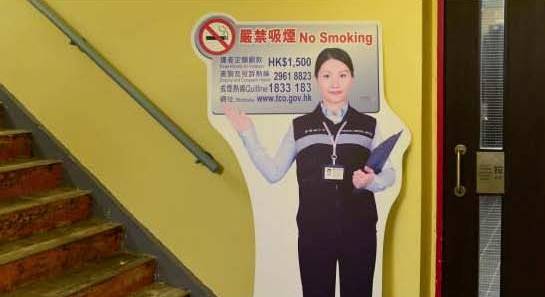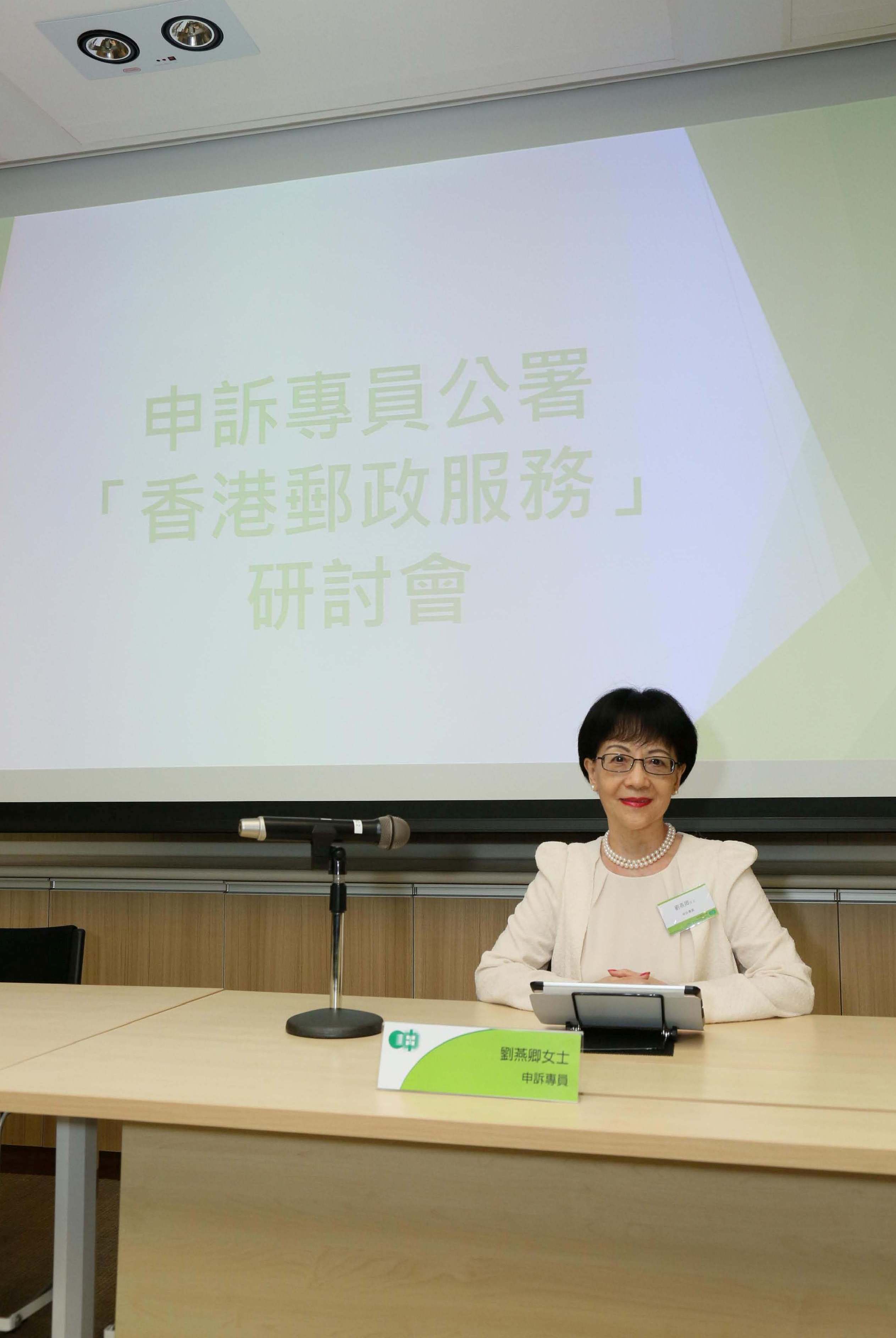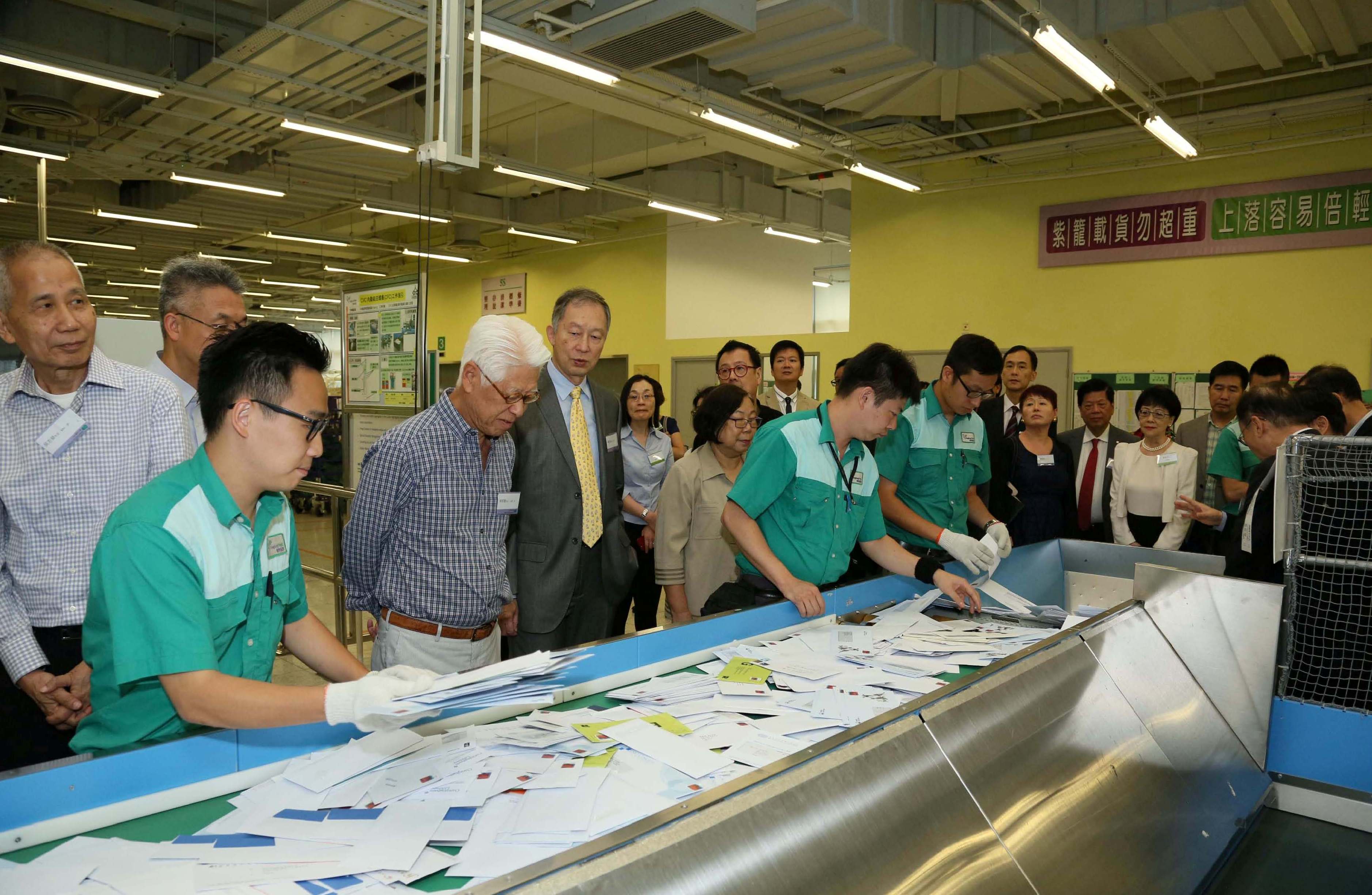HONG KONG JULY 2018
 HONG KONG
HONG KONG 
OFFICE OF THE OMBUDSMAN, HONG KONG
1. MEETING LEGISLATIVE COUNCILORS
1.1 Every year The Ombudsman of Hong Kong attends the Special Meeting of the Finance Committee of the Legislative Council to answer the Councilors’ enquiries on the Office’s Estimates of Expenditure for the new financial year as well as the work of the Office. This year, Ms Connie Lau, The Ombudsman of Hong Kong, met the Councilors on 16 April 2018.
1.2 In response to the Councilors’ questions, Ms Connie Lau informed the Councilors that the Office makes a constant effort to review and improve its complaint handling procedures. In 2018-19, the Office will continue to promote the use of mediation to handle cases involving no or minor maladministration for reaching a speedier and more direct resolution. Resources thus saved can then be redeployed to direct investigations and full investigation of more complex complaint cases.
1.3 The Office attaches great importance to developing the ability of investigation officers to resolve disputes and organises from time to time related workshops and training sessions. The Office has in place a sponsorship scheme to encourage investigation officers to attend more advanced mediation training courses and attain accreditation as mediators.
2. DIRECT INVESTIGATION (DI) / OWN-MOTION REPORTS
2.1 The Ombudsman of Hong Kong announced the results of six direct investigations in the first half of 2018. These direct investigation reports have been uploaded to the official website at www.ombudsman.hk for public viewing.
2.2. DI (i):Report on the support services provided by the Social Welfare Department (SWD) for persons with or suspected to have mental health problems and their families/carers and neighbours
2.2.1 The Ombudsman has examined at a macro level whether there are any inadequacies in the SWD’s mechanism for providing services and assistance to those in need through Integrated Community Centres for Mental Wellness (Wellness Centres) operated by non-governmental organisations in various districts.
2.2.2 In the course of the Office’s investigation, the SWD has adopted some improvement measures. The Office has further made five recommendations to the SWD.
2.3 DI (ii): Report on the Mechanism of the Food and Health Bureau and the Department of Health (DH) for Handling Smoking Offences
2.3.1 The Office receives from time to time public complaints against the Government’s ineffectiveness in combating illegal smoking. The investigation has identified a number of areas for improvement in the enforcement mechanism of the Tobacco Control Office(TCO)under DH, such as insufficient 3 inspections at night, thus missing the opportune time for enforcement; inadequate manpower, aggravated by a persistently high turnover rate of Tobacco Control Inspectors (TCIs), which has weakened the effectiveness of enforcement actions; TCO’s performance pledge falling short of public expectation; and the need to enhance the role of plain-clothes officers to complement the enforcement actions of TCIs.
2.3.2 The investigation shows that even some government departments cannot properly handle the illegal smoking problems in their own venues. It would therefore be difficult for government to encourage the venue managers in the private sector to support the tobacco control policy and to convince them to accept the Government’s proposal to amend the legislation for imposing criminal liabilities on venue managers regarding illegal smoking on their premises.
2.3.3 The Ombudsman has made 11 improvement recommendations to the Government.
2.4 DI (iii): Report on Government’s Control over Fly-tipping of Construction Waste and Land filling Activities on Private Land
2.4.1 The Office has found inadequacies in the control by the Environmental Protection Department (EPD) and the Planning 4 Department (Plan D) over fly-tipping of construction waste and landfilling activities on private land:
EPD should have conducted more comprehensive and proactive inspections;
EPD has yet to implement the use of Global Positioning System for deterring fly-tipping despite years of study;
Plan D takes too long to enforce its Reinstatement Notices, its prosecution actions have little deterrent effect and it sometimes does not require filled fish ponds to be fully reinstated; and
inter-departmental coordination should be more proactive.
2.4.2 The Ombudsman has made seven improvement recommendations to EPD and Plan D with a view to strengthening their control over fly-tipping and landfilling activities.
2.5 DI (iv): Report on Water Supplies Department’s maintenance of government water mains and risk management
2.5.1 In recent years, there have been frequent incidents of fresh and salt water main bursts, causing inconvenience to the public and resulting in huge waste of fresh and salt water.
2.5.2 This investigation has identified a number of inadequacies on the part of Water Supplies Department (WSD) with regard to three aspects, namely: minimising water main bursts, follow-up actions on cases of main bursts, and reducing leakages.
2.5.3 In the light of the above, The Ombudsman has made ten improvement recommendations to WSD. 2.6 DI (v): Report on Government Departments’ Handling of the Problem of Air-conditioner Dripping.
2.6.DI (v): Report on Government Departments’ Handling of the Problem of Air-conditioner Dripping
2.6.1 The Ombudsman found five inadequacies in the Food and Environmental Hygiene Department (FEHD)’s handling of complaints about air-conditioner dripping.
2.6.2 The Office consider that the Buildings Department can prompt/encourage building owners to include installation of communal drainage pipes, which is a highly effective solution, 6 in the comprehensive maintenance programmes of their buildings through its Building Safety Loan and issuance of Practice Notes to building professionals.
2.6.3 The Ombudsman has made a total of eight recommendations for enhancing FEHD’s enforcement actions and promoting the installation of communal drainage pipes.
2.7 DI (vi): Report on Immigration Department (ImmD)’s mechanism for following up cases of unregistered birth
2.7.1 A tragedy happened in Hong Kong in which a 15-year-old girl plunged to her death from a building. It was later discovered that the girl and her younger sister were born in Hong Kong, but their parents had never registered their births.
2.7.2 The investigation found that prior to the tragic incident, ImmD only sent out reminders in a routine manner to alert the parents concerned but never referred such cases to its Investigation Division, let alone instituted any prosecution. In the wake of the tragedy, ImmD immediately reviewed its practice and introduced a new follow-up mechanism. Nevertheless, upon examination, the Office found that there is still room for further improvement. In particular, the cases 7 often involve complicated family problems and call for the department’s early intervention.
2.7.3. In this light, the Office made four recommendations to ImmD for improvement.
3. Office of The Ombudsman held seminar on Hong Kong’s postal services
3.1 The Office of The Ombudsman held a seminar on Hong Kong’s postal services at the Central Mail Centre (CMC) on 7 June, with around 40 Advisers of the Office and Justices of the Peace (JPs) present.
3.2 The Ombudsman, Ms Connie Lau, said, “The Post Office (PO) shoulders the important responsibility of handling the public’s mail and has to face various new challenges brought about by changing times and technological advancements. Improvements must therefore be made in its mail delivery and mail tracing systems.” 3.3 Ms Lau urged the PO to enhance its efficiency in handling mail, thoroughly consider the opinions and suggestions raised at the seminar, and actively communicate with stakeholders with a view to exploring with them the direction of future development in an effort to further improve its postal services.
3.4 In a guided tour arranged by the PO, Advisers of the Office and JPs present at the seminar looked at the CMC’s equipment, such as the culler facer cancellers and the Optical Video Coding Integrated Systems, and had a chance to understand front-line postal services as well as the mail delivery procedures. Representatives from the PO also spoke with them on the challenges that have emerged in recent years, while the participants discussed and raised their views regarding the role of the PO in the territory-wide mail delivery service.
3.5 Since 2010, the Office of The Ombudsman has organised seminars each year on various topics for JPs and Advisers of the Office. These seminars aim to enhance their understanding of the work of different government departments and public organisations and the role of the Office, and provide a platform for them to express their views so that they can help promote the work of the Office through their daily contacts with the public, thereby contributing to improvement in public administration and services in Hong Kong.








